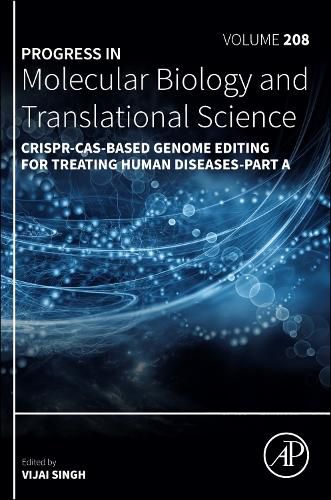Readings Newsletter
Become a Readings Member to make your shopping experience even easier.
Sign in or sign up for free!
You’re not far away from qualifying for FREE standard shipping within Australia
You’ve qualified for FREE standard shipping within Australia
The cart is loading…






CRISPR-Cas-Based Genome Editing for Treating Human Diseases-Part A, Volume 208 represents CRISPR-Cas systems for genome editing. Currently, CRISPR-Cas systems are proven a key technology for targeted genome editing, which is acting as a simple, rapid, and cost-effective solution. CRISPR-Cas9 system is being used in microbial genome editing, mammalian genome editing, disease models, and more. It has shown potential in human disease treatment. However, it is not easy to find CRISPR-Cas systems genome editing in a single source.
This volume offers CRISPR-Cas systems for human diseases, bacterial disease, gut microbiome editing, viral disease, protozoan disease, fungal disease, stem cell therapy, CRISPR in epigenetics, CRISPR in cancer, autoimmune and blood disorders. In addition, it highlights a number of aspects of the CRISPR-Cas systems that can help the basic understanding of students, researchers, clinicians, entrepreneurs, and stakeholders to perform their research with great interest.
$9.00 standard shipping within Australia
FREE standard shipping within Australia for orders over $100.00
Express & International shipping calculated at checkout
CRISPR-Cas-Based Genome Editing for Treating Human Diseases-Part A, Volume 208 represents CRISPR-Cas systems for genome editing. Currently, CRISPR-Cas systems are proven a key technology for targeted genome editing, which is acting as a simple, rapid, and cost-effective solution. CRISPR-Cas9 system is being used in microbial genome editing, mammalian genome editing, disease models, and more. It has shown potential in human disease treatment. However, it is not easy to find CRISPR-Cas systems genome editing in a single source.
This volume offers CRISPR-Cas systems for human diseases, bacterial disease, gut microbiome editing, viral disease, protozoan disease, fungal disease, stem cell therapy, CRISPR in epigenetics, CRISPR in cancer, autoimmune and blood disorders. In addition, it highlights a number of aspects of the CRISPR-Cas systems that can help the basic understanding of students, researchers, clinicians, entrepreneurs, and stakeholders to perform their research with great interest.